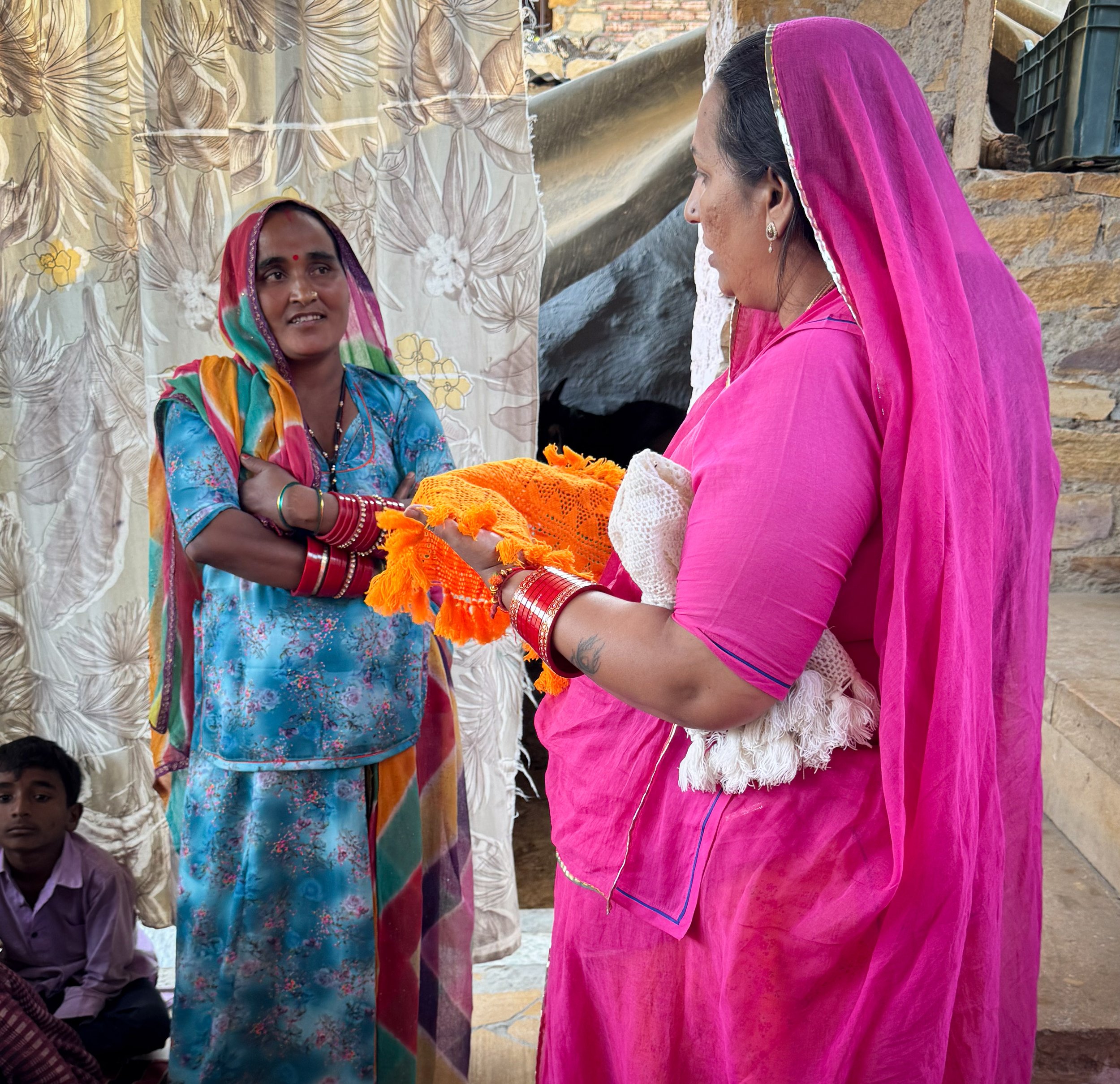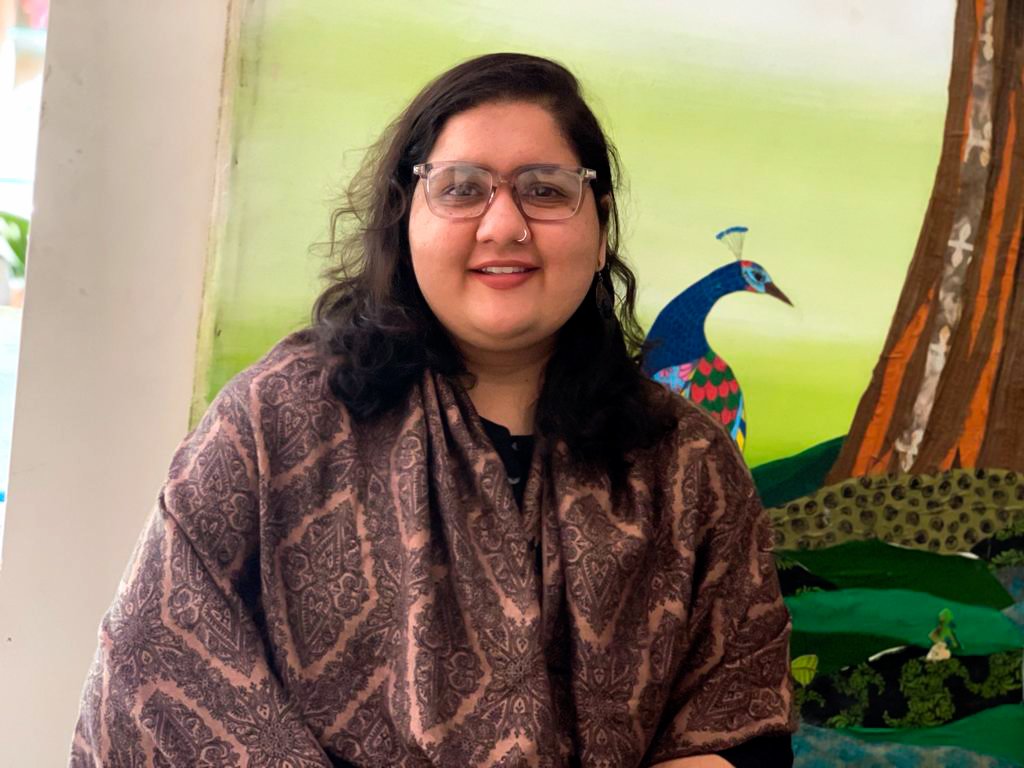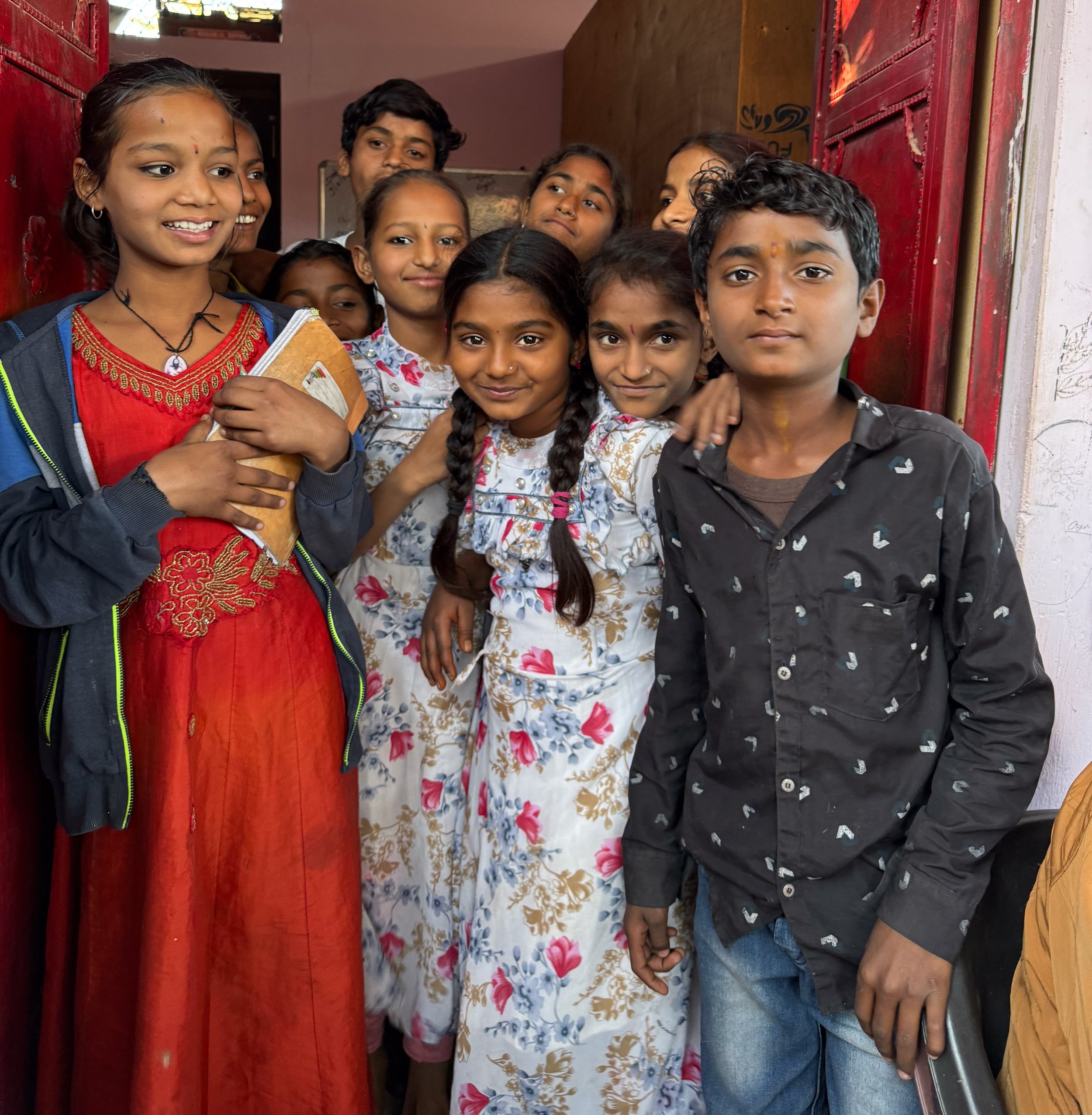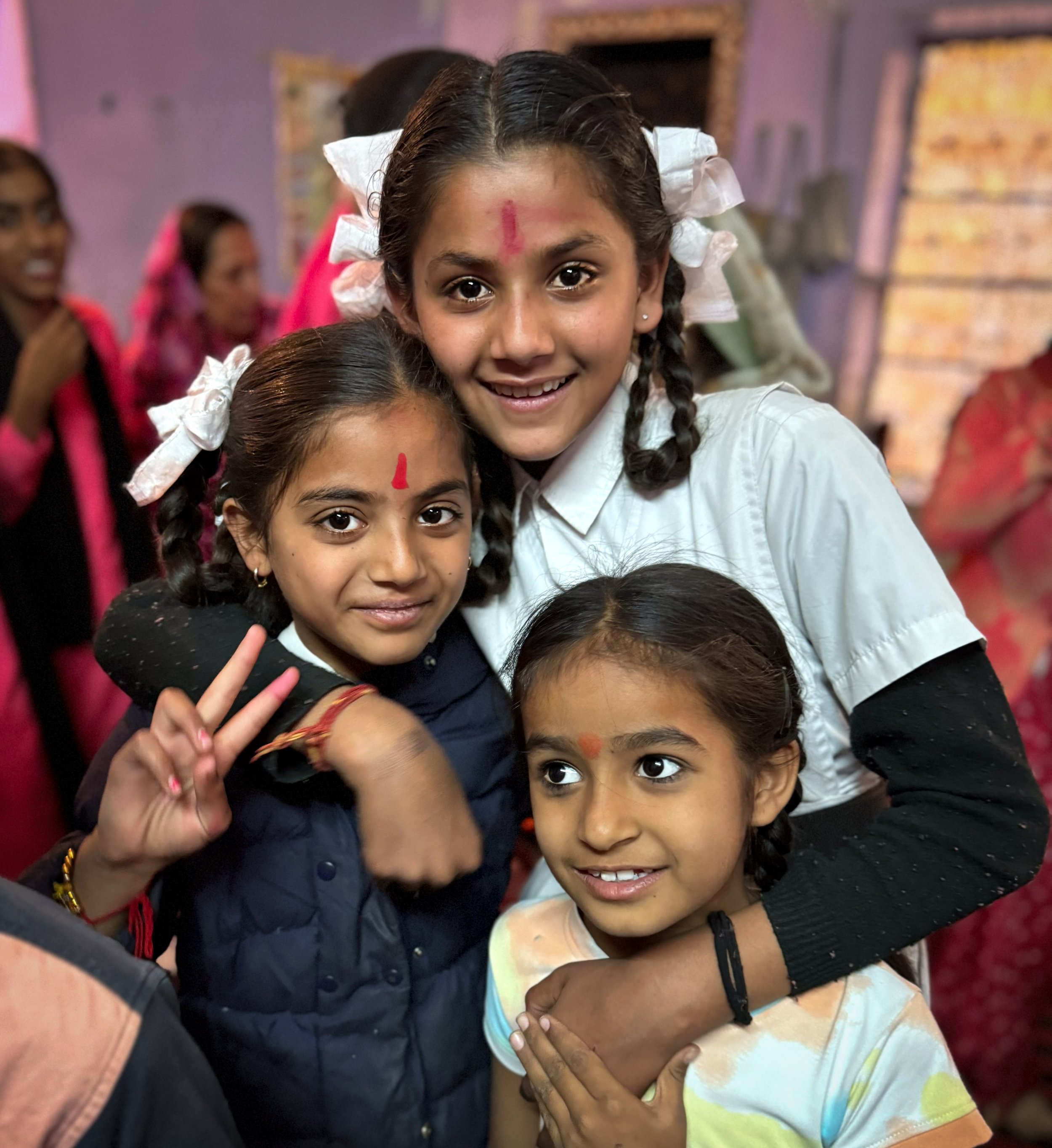The Jaisalmer Empowerment and Primary Education Centers: A Sambhali Story of Trials and Triumphs
By
Harini Varadarajan
The Sambhali Empowerment and Primary Education Centers in the city of Jaisalmer are beginning their third year on a very high note, but the Jaisalmer program’s route to success was fraught with many challenges and is a reminder of what women and girls here must themselves overcome to obtain an education.
In January 2022, Sambhali Trust expanded to Jaisalmer at the request of people living there who had come to know Sambhali’s programs when the Trust supplied food and other necessities during the pandemic. Jaisalmer is one of the least developed districts in Rajasthan and, while the team came armed with experience from the centers previously set up in Jodhpur and Setrawa, this did not prepare them for the level of poverty and unhygienic conditions of the neighborhoods Sambhali was looking to work in, or for how far removed Sambhali’s education programs were from the experiences of the people living there. Still, the team was undeterred in its mission to gain the trust of the local community and provide the education and empowerment programs that community members had requested.
Renu Kanwar
Sambhali began by expanding its team to include those who are from Jaisalmer and know the city well. Renu Kanwar, the Jaisalmer Program Officer, was among the first Sambhali staff hired in Jaisalmer and worked with other staff from the Jodhpur office to survey the bastis (Hindi word for slum inhabited by poor people) in Jaisalmer. Renu herself had very recently suffered the terrible double loss of her husband and her father and found solace and income in the work of Sambhali.
Four bastis were initially chosen as locations for the Centers: Bheel, which is inhabited by the Pakistani refugee community, Lohar which houses the blacksmith community, Sansi where women and girls work as rag-pickers, sifting, collecting, and selling materials from garbage dumps, and Gaffur Bhatta near where the Jaislamer program office is located. In some places, children were often left at home to fend for themselves nearly all day while their parents tried to earn a meager income, while in others the children often went with their mothers during the harvesting season to help them earn more money.
The opening of the Centers and the training of the new local teachers by the team who traveled from Jodhpur went smoothly during the first week. The children from the bastis were in full attendance as the mothers were happy to have someone watch over them in their absence. But when week two rolled in, the team quickly realized that this was going to be tougher than they expected. Some of the children who had been left unsupervised until now were naughty, unruly and, on occasion, even aggressive. A few even vandalized the one of the Centers, breaking the windows by throwing stones and tearing up the mosquito nets.
To make matters worse, the team realized that a “ghost story” about one of the buildings where a Center operated was creating fear among the participants. Upon inquiry, they learnt that the building used to be a hospital and that the room occupied during the lessons had been the mortuary. Some of the teenaged girls felt that the classroom was colder than typical because of the presence of ghosts. Even after the source of the cool temperature was determined to be the large open water storage feature of the room, they could not be convinced the building was safe. Eventually, the team was forced to relocate to another building in the basti.
There was also confusion about how Sambhali Trust operated, in part because of a history of non-profit organizations in the area that received funding to help women, but often provided no training and rather just passed on a small fraction of the funds they received to the women who were supposed to benefit from the program. Renu explained how this history impacted the Empowerment Center at Saasi basti. The women initially only came to attend lessons because they thought that they would get paid by Sambhali. It took her weeks to make them understand that Sambhali would be teaching them the necessary skills to earn an income.
It took almost an entire year for things to settle down and the team to gain the trust of the local community before the lessons given at the Empowerment Centers and Primary Education Centers yielded the hoped-for results. This success came from the understanding of the staff, almost all of whom were from the local community, from listening to participants concerns and fears, and by taking a firm but compassionate approach to the children who had no experience being learners. Over the course of the two years Sambhali programs have run in Jaisalmer there has been a sea of change, from rocks being thrown at windows to a growing waiting list of women and children who want to join Sambhali’s programs.
Arunima Soni
The support of the local community was essential to their success, says Arunima Soni, the Program Administrator at Jaisalmer. When the staff had to relinquish a community hall that they had occupied for a year, a local woman generously offered her home where she ran a small store. She even shut her store, which was her only source of income, during the Sambhali teaching hours so that the attendees would not be disturbed. With such strong support from the community and commitment from the staff, it’s no wonder that the Jaisalmer Sambhali Centers today are not only a place of education and empowerment but also a “safe haven” for the children and women of the bastis, says Arunima.
The teaching methods employed by the Sambhali staff at the Centers are vital to their success. When children didn’t even know how to hold a pencil, they were taught to write using a slate and chalk with teachers holding their fingers before moving on to pencil and paper. Most of the women who initially came to the center were in their mid-30s, and only spoke local languages, could not read, and their English was non-existent. They were taught Hindi and English using methods such as flashcards. Today, nineteen women have gone on to be registered with the government’s open education program which allows them to self-study and take the high-school exams. This was made possible by the Sambhali staff who not only educate the women, but also help them to obtain the necessary government permits and waivers for their enrollment into the open education program.
Kavitha is one among these amazing women. She works, cares for her ailing mother, manages the household all by herself, and soon plans to take her high school final exams. Another wonderful example is Basanthi, who had been working as a farmer, took her exams and successfully passed. She has since been promoted to supervisor with higher pay. Basanthi is an inspiration to her fellow farmer women showing them that rising the ranks through education is entirely possible.
Sambhali similarly works with the families of children beyond the walls of the Primary Education Center. Currently nineteen girls are being sponsored to enable them to attend private school. And in perhaps the greatest showing of faith by the families in Jaisalmer, fourteen girls have now traveled to Jodhpur to become a part of Sambhali’s boarding homes where they have joined other first-generation learners on track to complete secondary school and attend college.
In addition, the Jaisalmer staff make sure that learning is fun and creative. For the children, this may mean a few minutes to play so they won’t get bored from their studies or to draw to bring out their creative side. To enhance the creativity and income generating potential of the women, they have learned to make crafts and gifts out of waste, such as planters out of old jeans, pencil holders from used cardboard boxes, and sitting mats from leftover clothes. And in addition to sewing and embroidery—both part of the standard Sambhali curriculum—they have learned to crochet, make candles, and a variety of beautician skills.
The challenges faced by the families in Sambhali’s Jaisalmer programs—and how Sambhali works to create success—is perhaps best seen in the story of the Kumar family. The five daughters and one son had been an integral part of the Sambhali’s program since day one and had never missed a single day of class. The two older daughters attended the Empowerment Center and the three younger daughters and their younger brother attended the Primary Education Center. But last year, they were all absent for an entire week, prompting concern. Upon inquiry, the tragic suicide of their father in the one-room house in front of the children was found to be the reason. Although the children eventually came back to attending lessons, things were never the same again. The widowed mother, Radha, who earns her only income rag picking, was forced by her in-law family to marry off the three oldest girls, ranging in age from 11 to 15 as the in-laws were worried that they had no male protection at home. While it is heart wrenching to hear about such young girls being forced into marriage, there was very little that Sambhali could have done in this instance other than continuing its ongoing efforts to educate against such child-marriage practice. Yet, even in this tragic situation, Sambhali’s training will continue to help. The two older girls had completed the Empowerment Center program and received sewing machines. They went on to sew clothes for their entire basti the following year and eventually also made their own wedding lehengas (traditional Rajasthani dress). Renu feels confident that the girls will be okay as they at least have sewing skills to fall back on if necessary. Radha managed to resist her in-law’s pressure to marry off the two younger daughters who still attend school and are recipients of Sambhali educational scholarships. With very little formal education prior to Sambhali, the two girls have scored first and third ranks in their class at school in the most recent half yearly examination. The Sambhali team intends to support the girls as long as possible and is hopeful there will soon be space at the boarding homes in Jodhpur where they could become the first educated women in their family, providing for a better future for the entire family.
The Sambhali Empowerment and Primary Education Centers are a shining beacon of education, strength, and hope for the women and children of Jaisalmer and serve as a safe retreat in which they can truly be themselves and revel in the sisterhood of the community and joy of learning. With your support, Sambhali can continue and expand this valuable work with the women and children of Jaisalmer.








